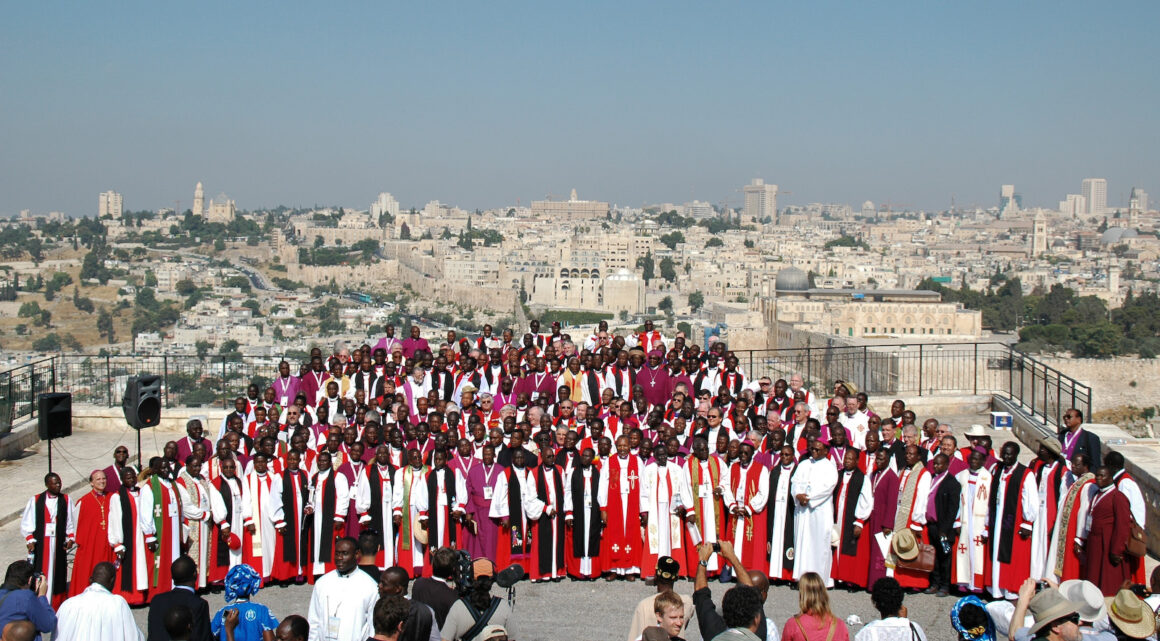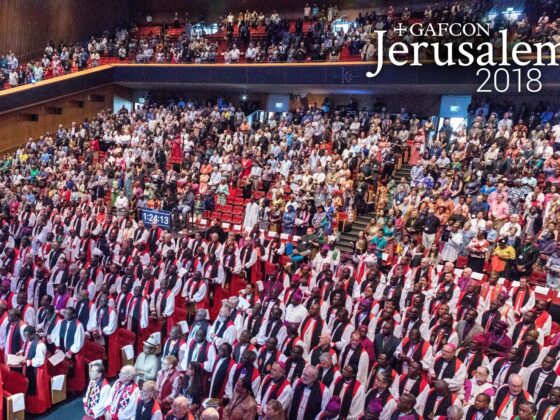And the word of the LORD came to me, saying, “Jeremiah, what do you see?” And I said, “I see an almond (Heb. shaqed) branch.” 12 Then the LORD said to me, “You have seen well, for I am watching (shaqad) over my word to perform it.” (Jeremiah 1:11-12)
I have been watching Anglican affairs for a long time – a quarter century at least. In 2018 I assembled some of my writings in a book titled The Global Anglican Communion: Contending for Anglicanism 1993-2018. About the same time, I took up blogging, which was something of a challenge for a digital dinosaur like myself. I called the blog “Contending Anglican” (I have now included my “Contending Anglican” posts in a wider collection of writings, “Stephen’s Witness.”)
I originally wrote “Seven Contentions” in the run-up to Gafcon 2018 in Jerusalem and in anticipation of Lambeth 2020. Gafcon 2018 fulfilled my fondest expectations (see my subsequent book The Gospel of God and the Church of God: Global Anglican Essays [2020]). Lambeth 2020 did not come off, due to the Covid pandemic. It is now scheduled for 26 July – 8 August 2022. Meanwhile the next Gafcon Assembly is scheduled for April 2023 in Kigali, Rwanda.
So in some ways, the same questions I addressed in 2018 arise again four years later and justifies a look back at these Contentions.
This brings me to my first Contention, which was to justify my book title The Global Anglican Communion and its
vision of a renewed and reformed Global Anglican Communion, a communion of churches that builds on the heritage of the Church of England and represents the emerging leadership of formerly colonial Anglican churches, whereby the oversight of doctrine and discipline has shifted from Canterbury to the Global South.
I stated in this first essay that this vision is aspirational, that is, not yet realized. While I stand by that qualification, I want to add that it seems God may be running ahead in bringing that vision to reality. He is doing this partly by driving revisionism faster and faster to its outright denial of the faith. He is also doing so by gathering the church in a powerful way, far beyond “realistic” hopes.
As I pack bags to leave for Jerusalem, I would like to sum up the logic of these Contentions.I am going to begin at the end with Contention 7: Lambeth Speaks Plainly (That Was Then). I have been privileged to attend three major Conferences in 2013, 2008 and 1998. And the Lambeth Conference in 1998 is where it all began. Passage of Lambeth Resolution I.10 on Human Sexuality was an historic event in three ways:
- It articulated a clear moral case on the pressing issue of homosexual practice by stating that God ordained two and only two ways of faithful sexual relationships: marriage of one man and one woman and abstinence for those not married. This moral stance was based on the authority of the Bible and hence homosexual practice, gay ordinations, and same-sex “unions” are “incompatible with Scripture” and could not be advised.
- It was a Resolution written and promoted by the bishops of the majority Global South churches, who overcame the machinations of the Communion bureaucracy. For these churches, Lambeth I.10 continues to be a non-negotiable statement of Anglican orthodoxy, even as the Lambeth Establishment has tried to insert “faithful same-sex partnerships” as a third alternative.
- It was the culmination of “enhanced” conciliar governance by the Primates, who were authorized to monitor the response of the Episcopal Church and others who defied the Resolution. When the Archbishop of Canterbury reneged on the Primates’ resolutions in 2007, the Global Anglican Future Conference resulted, led by a Gafcon Primates’ Council.
For this reason, I have argued that Lambeth 1998 was the last true Lambeth Conference, with Gafcon as its successor, and that the 2007 Primates’ Meeting at Dar es Salaam was the last true Primates’ meeting convened by Canterbury, which has been succeeded by the Gafcon Primates.
I wrote a four-part Contention 5 (Parts A and B and C and D) on the issue of same-sex marriage, which was approved by the Episcopal Church USA in 2015 and is now to be ensconced in its canons and liturgy. Twenty years ago, I argued that homosexual “unions” or “partnerships” would inevitably morph into same-sex marriage. This prediction was fulfilled first in the secular realm, and now the “progressive” churches are running to catch up, not only in North America but in Scotland and Brazil.
The Church of England and the Archbishop of Canterbury are proposing what I call a “thumbs-sideways” policy of blessing same-sex civil unions while reserving Holy Matrimony for opposite-sex couples only. I argue that their position is logically untenable and politically Machiavellian. They think they can con the conservative churches into a compromise with language about “walking together” and “good disagreement” at least to get them past Lambeth 2020.
In Contention 4 – Gafcon and Prophetic Traditionalism – I argue that, by contrast with this faux progressivism, Gafcon’s Jerusalem Declaration is conservative going back to the classic sources (ad fontes) of Scripture, the Church Fathers and the Anglican formularies. At the same time Gafcon is prophetic in applying these authorities to contemporary issues of sexuality, mission, economic and environmental stewardship, and ecumenism. Hence when Gafcon claims to look to the Global Anglican future, it is doing so through the spectacles of God’s Word written and the historic tradition of the Church.
In Contention 3 – Is Gafcon a Ginger Group? – I examine Justin Welby’s flippant and demeaning characterization of Gafcon as a “ginger group,” i.e., as a small single-issue lobby. One of the ironies of such a dismissal of Gafcon is that it prevents its opponents from actually engaging with the points at issue raised by the Jerusalem Statement and Declaration. The Communion Establishment has placed its bets on the hope that by ignoring Gafcon, it will just wither away. Check back in two weeks to see how well that tactic has played.
In Contention 2 – “Taking Sweet Counsel Together” – I address those who would wish to sit on the fence between Gafcon and Canterbury. I pose this ultimately as a spiritual issue.
So my question to Primates, bishops and other leaders who attend GAFCON 2018 is this:
how can you sit in council in Jerusalem and enjoy sweet fellowship with brothers who have been expelled from their churches, sued out of their properties, defrocked from their ministries, and denied even the name of “Anglican” (as was stated in the latest Lambeth Primates’ Communiqué) and then turn around and sit at table in Canterbury with bishops of the Episcopal Church (and others) who have expelled these brothers?
When I wrote this two months ago, some may have seen this as a “Western” dispute. Now it comes to the Global South as well. How will you sit at Gafcon with the new Primate of the Anglican Church of Brazil and then go and sit with the Primate of the Episcopal Church of Brazil, who has authorized God’s blessing on same-sex marriages?
It is often said that the Global South is more “relational” than the West. OK, then how can you let the Lambeth Establishment lure you into an impossible breach of fellowship?
This brings me to my first Contention, which was to justify my book title The Global Anglican Communion and its
vision of a renewed and reformed Global Anglican Communion, a communion of churches that builds on the heritage of the Church of England and represents the emerging leadership of formerly colonial Anglican churches, whereby the oversight of doctrine and discipline has shifted from Canterbury to the Global South.
I stated in this first essay that this vision is aspirational, that is, not yet realized. While I stand by that qualification, I want to add that it seems God may be running ahead in bringing that vision to reality. He is doing this partly by driving revisionism faster and faster to its outright denial of the faith. He is also doing so by gathering the church in a powerful way, far beyond “realistic” hopes.
We’ll see. I’m laying aside my contentious mantle for a couple weeks and looking forward to sweet fellowship with many fellow Anglicans in the Holy Land.





